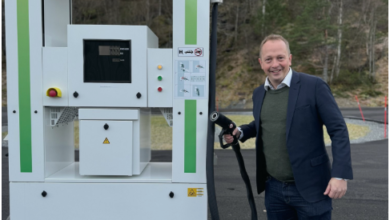Repsol, Talgo to jointly develop a renewable hydrogen-powered train
Repsol and Talgo will develop a renewable hydrogen-powered train to promote emission-free rail transport in the Iberian Peninsula.

Repsol (a Spanish energy and petrochemical company) and Talgo (a Spanish producer of intercity, standard, and high-speed passenger trains) will collaborate to develop renewable hydrogen-powered trains and promote emission-free rail transport in the Iberian Peninsula.
Under the partnership, Talgo will be responsible for the design, manufacture, and commissioning of the new self-propelled trains for short and medium distances, while Repsol will offer its renewable hydrogen generation infrastructure and its logistical means to supply the railway network.
The collaboration is in line with the government Hydrogen Roadmap approved last October to have two lines of hydrogen-powered commercial trains by 2030.
The agreement is signed by Juan Abascal, Repsol’s executive director of Industrial Transformation and Circular Economy, and Carlos Palacio Oriol, the Chairman of Talgo, at the train manufacturer’s plant in Las Rozas, Madrid.
Repsol is the leading producer and consumer of hydrogen in the Iberian Peninsula and operates the largest hydrogen plant in Europe. It announced its plans in November 2020 to be at the forefront of the hydrogen market in the Iberian Peninsula and aims for an installed capacity of 400 MW by 2025 and over 1.2 GW by 2030. Repsol will use organic waste to produce biogas at its industrial centres for the production of renewable hydrogen. It plans to install two electrolysers with a capacity of 100 MW in Cartagena and Petronor to source renewable hydrogen. Petronor-Repsol launched Basque Hydrogen Corridor in February 2021, which brought together 128 companies, including Talgo, the Hydrogen Valley Catalonia, Universitat Rovira i Virgili, Repsol, and Enagás.
Talgo has already been working on hydrogen-powered trains and has developed its Vittal One train, a modular solution for medium-distance and commuter trains powered by hydrogen fuel cells, the first dual hydrogen-electric train. It plans to put the first train in November to demonstrate and validate the concept in conditions similar to commercial operation.
